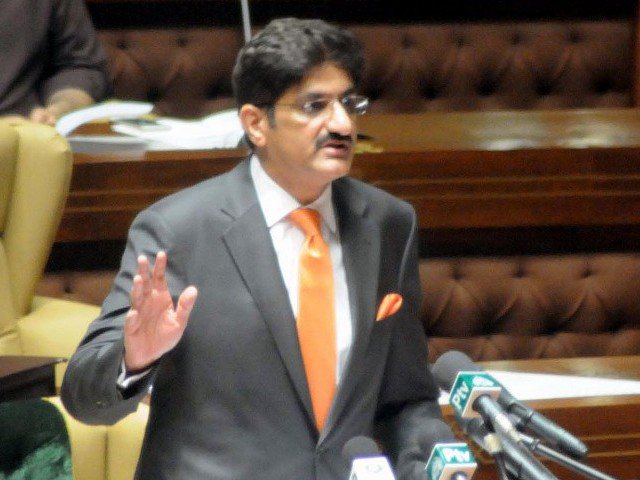KARACHI: Amidst boos and hisses from the opposition benches, Sindh Finance Minister Syed Murad Ali Shah presented the budget for 2018-19 on Thursday with an outlay of Rs1.14 trillion, up 15.8 per cent from the revised estimate for the ongoing fiscal year.
The province will run a deficit of Rs20.4 billion in 2018-19, although budget documents indicate a likely increase of 16.2 per cent in its total receipts. The finance department expects to end the ongoing fiscal year with a deficit of Rs21.2 billion as opposed to the initial estimate of Rs14.3 billion.
“For the second year in a row, we are not proposing any new taxes in the budget,” Shah said.
Current expenditure, which consists of salaries and other non-development heads, amounts to Rs800 billion, or almost 70 per cent of the total budget for 2018-19. Development expenditure will be Rs344 billion, including the Annual Development Plan (ADP) of Rs252 billion.
In view of the upcoming election, the government has proposed that 80 per cent of the ADP (Rs202 billion) should be set aside for ongoing schemes. The rest of the development funds, amounting to Rs50 billion, should be left in a “block provision” for new schemes to be announced by the next government, according to budget documents.
“This year, we are requesting this house to authorise expenditure for only three months: from 1st July to 30th September,” he said, noting that it was the ‘rightful mandate’ of the incoming government to set budget priorities for itself.
Resource mobilisation
Sindh relies heavily on the federal government to meet its revenue needs. Three-quarters of its receipts originate from the federal government, which distributes funds among the provinces according to the last National Finance Commission (NFC) award.
Shah called for an immediate decision on the long-delayed 9th NFC award, which is likely to enhance the share of Sindh in the federal divisible pool of funds. “The delay is causing huge economic loss to the provinces,” he said. One of the criteria for the funds’ distribution among the provinces is their respective capacity to generate revenue — something that Shah’s government prides itself on. Revenue mobilised by Sindh is notably higher than the other provinces.
He also highlighted the performance by the Sindh Revenue Board (SRB), a body set up to collect sales tax on services in 2011-12. It collected Rs100 billion in 2017-18 as per the target. The mobilisation under this head amounted to only Rs16 billion in 2010-11 when the federal government was responsible for its collection. The next year’s estimates show the SRB will collect Rs120 billion.
“With this performance in perspective, I would urge the federal government that the sales tax on goods may also be devolved to provinces. I can assure with confidence that we can handle it very effectively as well,” he said.
Although Shah has repeatedly hailed the SRB’s performance in recent years, the state of overall provincial tax collection seems far from satisfactory.
The Sindh government has increasingly become reliant on the sales tax on services, like advertising, franchise service providers, restaurants and property developers. But sales tax is an indirect tax. It constitutes regressive taxation because it penalises the use of services rather than taxing income or profits.
The share of direct taxes in the total provincial tax receipts is only 7.4 percent as per the 2018-19 budget estimates. Direct taxes are likely to be just Rs16.5 billion out of the total expected provincial tax receipts of Rs223.2 billion for 2018-19.
One of the direct taxes that Sindh has apparently failed to mobilise is the tax on agriculture income. It’s expected to be only Rs2 billion in 2018-19. This equals to only 12 percent of total direct taxes that the province is likely to generate in 2018-19. It will be hardly 0.9 percent of the total direct and indirect provincial tax collection in the next fiscal year, budget documents show.




